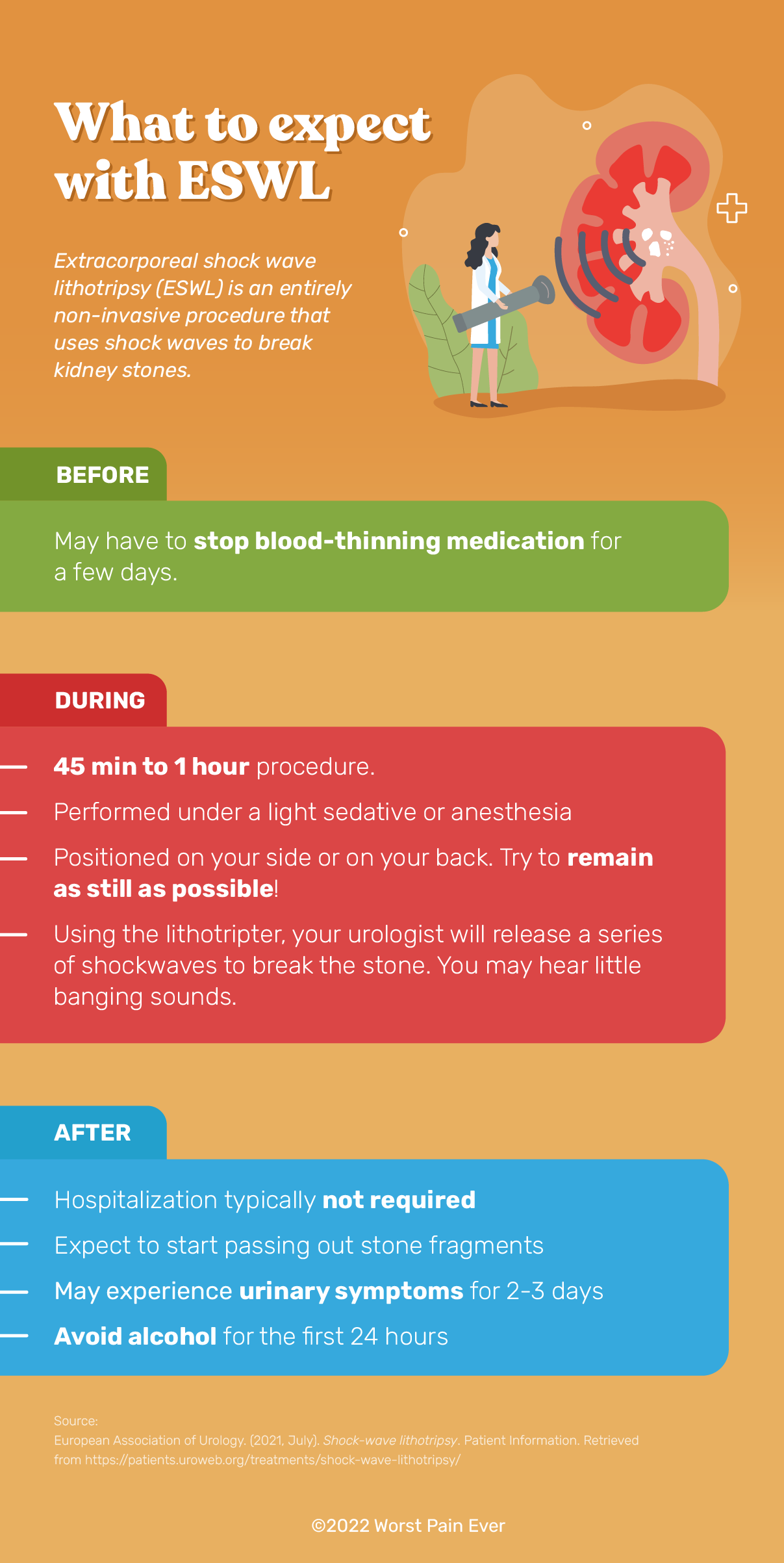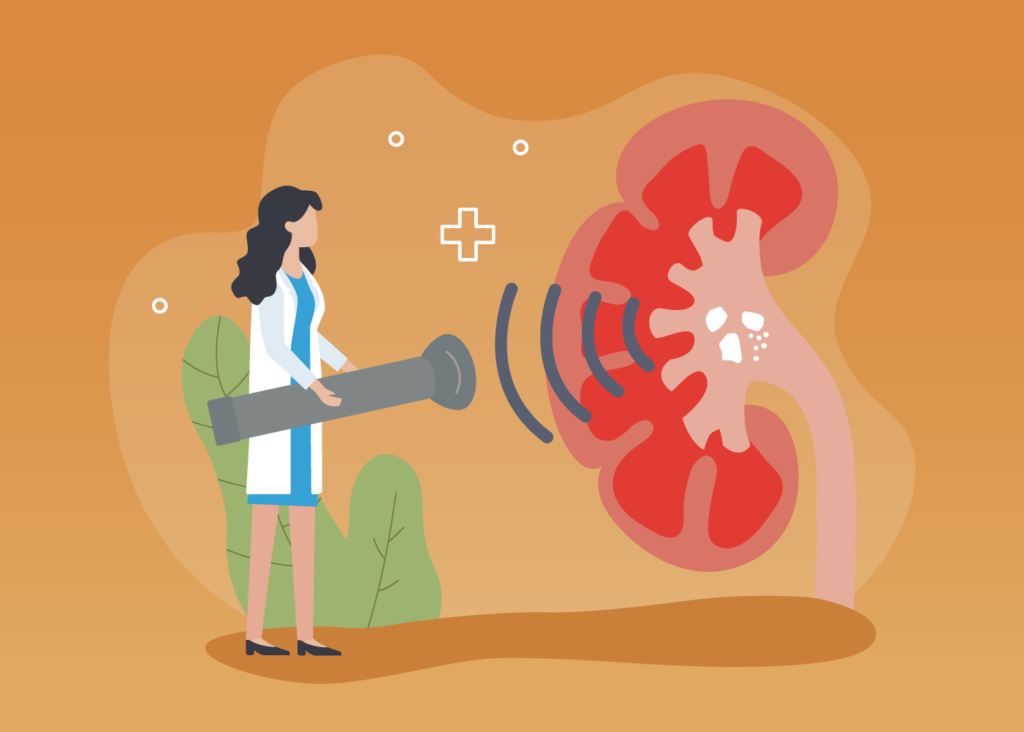Going for your first ESWL treatment can be unnerving. What should you do to prepare for it? Is it going to hurt? Don’t worry – we got you! Here’s everything you need to know about ESWL for kidney stones.
What is ESWL?
Extracorporeal shock wave lithotripsy is a non-invasive procedure that uses shock waves to break up kidney stones in your urinary tract¹. The shock waves are transmitted by a machine (known as a lithotripter) and directed at the kidney stone, shattering it into smaller fragments. These fragments are left to pass out of your body when you pee².
Fun fact: Almost 95% of stones can be treated with ESWL³. It is the most common treatment for kidney stones in the U.S.⁴!
Who is it suited for?
Generally, ESWL works better for people with smaller stones that are less than 20mm in diameter⁴. However, it also depends on other factors, such as the size, shape and location of your stone. If your stone is too big (e.g. >20mm) or you are at risk of infection, your urologist may recommend other treatment options, such as ureteroscopy (URS) or percutaneous nephrolithotomy (PCNL)⁵.
If you’re pregnant, have a bleeding disorder, or are highly prone to infections, your urologist may also advise going for a different type of treatment⁴.
How should I prepare for my ESWL appointment?
Tell your urologist if you’re taking any anticoagulants (blood-thinning medication) such as Warfarin. You will be advised to stop taking it a few days before your procedure⁶. If you’re taking other kinds of medication – or even health supplements⁷ – check with your urologist to make sure!
Depending on your urologist’s technique, the type of stone and your current condition (e.g. if you are extremely anxious about the procedure), you may require general anesthesia⁴. In that case, you may have to stop eating and drinking two to six hours before the procedure⁸. Otherwise, you’re generally free to carry on with your daily routine.
Either way, you will be placed under a sedative or general anesthesia for the procedure⁴, which can make you a little woozy. Remember to arrange for a friend or family member to accompany you home!
What happens during the procedure?
The procedure usually takes about 45 minutes to an hour⁶. In the treatment room, you will be asked to lie on a table. You will then receive a light sedative or anesthesia, usually through an intravenous line (IV)². Don’t worry – this is just to help you remain still and minimize any discomfort you may feel⁴.
After locating the stone with the help of an X-ray or ultrasound (or both), your body will be positioned so your urologist can target the stone more precisely.
Using a lithotripter, a series of shock waves (a few hundred or thousand) will be administered at the stone. During this process, your urologist will adjust the power and the intervals of the shock waves as needed to break the stone up. If you hear little banging sounds, don’t be alarmed! It’s just the shock waves doing their job.
Sometimes, if the fragments are still too large, another surgery might be required to extract them⁶.
How should I take care of myself after treatment?
Good news – hospitalization is typically not required, and you should be able to go home on the same day! Make sure to get lots of rest, and avoid any strenuous activity for the first few days².
At home, you can expect to start passing out stone fragments through your urine. This may cause some blood in your urine and some abdominal pain for several days. This is normal and can often be treated with oral pain medication⁴.
You may need to catch these fragments so your urologist can perform a stone analysis. By finding out what type of stone you’re forming, they will then be able to adjust your follow-up treatment plan accordingly.
Drinking lots of water will help to clear out the bloody urine and flush out stone fragments⁹. You should also avoid alcohol for at least the first 24 hours, including beer. This is because the surface of your urinary tract is still raw after treatment, and alcohol may cause irritation¹⁰.
During your recovery period, look out for any signs of a urine infection, such as fever, pain when passing urine, or cloudy or smelly urine⁶. If you experience any of these symptoms, call your urologist immediately!
Too much information to remember? Save the image below on your phone to refer to before your appointment – or share it with someone you know is looking for stone treatment options!

Sources:
-
Extracorporeal Shock Wave Lithotripsy (ESWL). John Hopkins Medicine. Retrieved 6 September 2022, from https://www.hopkinsmedicine.org/health/conditions-and-diseases/kidney-stones/extracorporeal-shock-wave-lithotripsy-eswl#:~:text=ESWL%20is%20a%20noninvasive%20procedure,on%20their%20own%20after%20EWSL
-
ESWL (Extracorporeal Shock Wave Lithotripsy). VHC Physician Group. Retrieved 6 September 2022, from https://www.vhcphysiciangroup.com/urology/services/procedures/outpatient-surgery/extracorporeal-shock-wave-lithotripsy-eswl/
-
Nielsen, T., & Jensen, J. (2017). Efficacy of commercialised extracorporeal shock wave lithotripsy service: a review of 589 renal stones. BMC Urology, 17(1). https://doi.org/10.1186/s12894-017-0249-8
- Kidney Stone Treatment: Shock Wave Lithotripsy. National Kidney Foundation. Retrieved 6 September 2022, from https://www.kidney.org/atoz/content/kidneystones_shockwave
-
Assimos, D., Krambeck, A., Miller, N., Monga, M., Murad, M., & Nelson, C. et al. (2016). Surgical Management of Stones: American Urological Association/Endourological Society Guideline, PART I. Journal Of Urology, 196(4), 1153-1160. https://doi.org/10.1016/j.juro.2016.05.090
- Lithotripsy (Extracorporeal Shock Wave Lithotripsy). Oxford University Hospitals. Retrieved 6 September 2022, from https://www.ouh.nhs.uk/patient-guide/leaflets/files/14428Plithotripsy.pdf
- Shock Wave Lithotripsy: Before Your Procedure. MyHealth.Alberta.ca. Retrieved 6 September 2022, from https://myhealth.alberta.ca/Health/aftercareinformation/pages/conditions.aspx?hwid=zu2200
- Can I eat or drink before an operation?. NHS. Retrieved 6 September 2022, from https://www.nhs.uk/common-health-questions/operations-tests-and-procedures/can-i-eat-or-drink-before-an-operation/#:~:text=Usually%2C%20before%20having%20a%20general,up%20food%20into%20your%20throat
-
Extracorporeal Shock Wave Lithotripsy (ESWL). UW Health. Retrieved 6 September 2022, from https://patient.uwhealth.org/healthfacts/5371
- Post-Operative Instructions after Extracorporeal Shock Wave Lithotripsy. The Corvallis Clinic. Retrieved 6 September 2022, from https://www.corvallisclinic.com/urology/post-operative-instructions-after-extracorporeal-shock-wave-lithotripsy/





